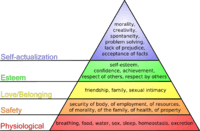Hierarchy facts for kids
A hierarchy (pronounced: HIGH-er-ark-ee) is a way of organizing things or people in a ranked order. Think of it like a ladder or a pyramid. At the top, there's usually one main thing or person, and everything else is placed below it in different levels. Each level is under the one above it. This system helps decide who can make decisions and who needs to follow those decisions.
For example, in a company, you might have a top manager, then several levels of middle and lower management, and finally, the regular workers at the bottom. In an army, you have a general at the top, followed by colonels, corporals, sergeants, and then privates. In these examples, people higher up have more authority and power than those below them.
Contents
Making Decisions in a Hierarchy
Hierarchies are important for how decisions are made in different types of governments.
In a Democracy
In a democracy, decisions are made by educating people about different issues and then having them vote. This happens in an election to choose leaders, or a referendum to choose between different options.
- Political Parties: Different groups, called political parties, offer their own leaders or ideas to the public. This helps make complex issues easier to understand and decide on.
- Following Decisions: After a decision is made, people usually accept it and wait for the next election to try and change things. This helps avoid big conflicts like a civil war.
In a Dictatorship
In a dictatorship, one powerful person makes all the decisions. Everyone else is expected to follow these decisions.
- Consequences for Not Following: If someone refuses to follow a decision, it's seen as a challenge to the leader's power. People who don't agree might be forced to leave the country, be put in prison, or face other serious consequences.
- One Power Group: In a dictatorship, there is usually only one main group in power. Any other groups are forced to join it or fight against it. Because of this, civil wars are much more common in dictatorships than in democracies.
Related pages
Images for kids
-
Matryoshka dolls, also known as nesting dolls or Russian dolls. Each doll is encompassed inside another until the smallest one is reached. This is the concept of nesting. When the concept is applied to sets, the resulting ordering is a nested hierarchy.
See also
 In Spanish: Jerarquía para niños
In Spanish: Jerarquía para niños
 | Dorothy Vaughan |
 | Charles Henry Turner |
 | Hildrus Poindexter |
 | Henry Cecil McBay |




